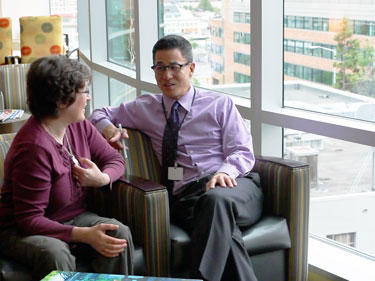Patients with Advanced Cancer May Benefit from Discussing Prognosis with Physicians
, by NCI Staff
Patients with advanced cancer who discussed their prognosis with their physicians had more realistic expectations about life expectancy than patients who did not have such conversations, according to a new study. Moreover, these discussions did not damage the patients’ emotional well-being or compromise their relationships with physicians.
The study also showed that patients who had discussions about prognosis with their physicians were more likely to plan for end-of-life care and to prefer comfort care over aggressive treatment during the end stages of life than other patients.
The findings appeared October 5 in the Journal of Clinical Oncology.
Previous studies have suggested that most patients with cancer want some prognostic information, such as whether their cancers are curable. But there is less research on whether patients with advanced cancers often want specific estimates of life expectancy and on how learning these details may affect patients.
To explore these questions, Holly Prigerson, Ph.D., of Weill Cornell Medicine and her colleagues studied 590 patients with metastatic cancer who had received at least one round of palliative chemotherapy.
Participants completed a baseline interview and were followed until their deaths (or the end of the study). In addition to reporting on discussions about prognosis and their interest in information about how long they would live, patients estimated their own life expectancies. They also responded to questions about their relationships with their physicians, their levels of distress, whether they had completed advance directives, and preferences for end-of-life care.
An analysis of the results revealed a large discrepancy between what patients in the study wanted to be told about prognosis and what they recalled being told: 71 percent of patients said they wanted information about their life expectancies, but less than 18 percent had received an estimate of their prognosis from a physician.
“The fact that the vast majority of cancer patients who are dying say that they want to know their prognosis seems surprisingly courageous,” said Dr. Prigerson. “It is also disappointing that less than 18 percent of patients reported that their oncologists told them how long they had to live.”
Many patients in the study were “remarkably optimistic” about how long they had to live, as has been reported previously. The new results suggest that conversations between physicians and patients about prognosis may help to correct these misperceptions without causing patients sadness and anxiety, according to the study authors.
“There was no emotional fallout from the patient–physician conversations about prognosis,” Dr. Prigerson noted. She added, however, that “health care providers are often reluctant to communicate grim news, as anyone would be.”
There may be other reasons why physicians avoid discussing prognosis with patients who are dying, including the difficulty of developing accurate survival estimates and uncertainty about whether patients would like to know these estimates, the study authors noted.
The new findings suggest that, despite the difficulty in having these conversations, many patients may benefit from more frequent prognostic updates, particularly as a way to plan for the future. “It is encouraging that patients who reported a prognostic disclosure by their oncologists were more likely to complete a DNR [do not resuscitate] order and to want comfort care,” said Dr. Prigerson.
The study had some limitations. Self-reported answers from patients may be subject to recall bias, for example, and the associations described in the study do not demonstrate cause-and-effect, the authors noted.
Dr. Prigerson also cautioned that not all patients benefit from having prognostic information..
“Some patients may not be ready to hear and process bad news,” she explained. “And some patients may actually be provided with information that they reject as not mattering because they consider their future to be in God’s hands, not in their doctors’ hands.”
In these cases, “more harm than good can be done by forcing the situation,” she continued. “In a previous study, however, we found that more than 90 percent of patients benefit from prognostic disclosures, and it is a minority of patients who, for religious or psychological or social reasons, do not benefit.”
